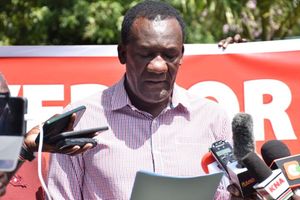
City Hall, the headquarters of the Nairobi City County Government.
Nairobi County Government is eyeing an additional Sh5 billion income through the regularisation of unapproved buildings as part of its broader strategy to meet a Sh20.9 billion revenue target for the 2025/2026 financial year.
Regularisation is the process of approving buildings whose construction plans were either not submitted or approved by the county government.
This also applies to developments that deviated from the approved plans. For instance, if a developer got approval to build two floors but instead did five. Such developers can now apply for retrospective approval, subject to penalties and compliance checks.
Appearing before the County Assembly’s Planning Committee, Nairobi Chief Officer for Urban Planning Patrick Analo said the initiative targets nearly two million residents living in informal or irregularly developed areas.
“Our focus is on Embakasi East, Embakasi West, Embakasi North, Embakasi South, Ruai, Kasarani, Mwiki, and Roysambu. These are areas that were originally owned by land-buying companies or where government land was invaded by squatters. Some of these matters went to court and rulings were made,” Mr Analo said.
A case in point is that of a land dispute between the late businessman Gerishon Kirima’s family and settlers. The court ruled in favour of the Kirima family, granting it the option to either evict settlers or negotiate buyouts. The parties have since agreed to pursue a buyout arrangement, paving the way for regularisation.
“All the areas I have mentioned are home to nearly two million people. The goal is to bring these people into the fold to enable them to get official county approvals for their land and to submit applications for buildings that were constructed without prior consent,” Mr Analo said.
The county said that the initiative is not just about enforcement but also economic empowerment. Once regularised, residents will be able to use the documents to access credit, mortgages, and other financial services.
The drive also targets 7,000 residents who recently got title deeds from Governor Johnson Sakaja.
“Once they have these documents, it provides a sense of security. In many cases, banks ask where the property is located and whether the development was approved,” Mr Analo said.
However, the county has cautioned residents in areas such as South B and South C against misusing the programme.
“The Physical Planning Act doesn’t allow anyone with a title deed to develop land without obtaining prior approval from the county government,” he said.
Mr Analo also clarified that no approvals will be granted for land under legal dispute.
The process is being guided by the newly enacted Nairobi City County Regularisation of Unauthorised Developments Act, 2025.
The law establishes a Regularisation Advisory Committee composed of a planner, surveyor, architect, engineer and representatives from public health, lands and the environment. Applicants must submit detailed plans and documentation prepared by licensed professionals.
The county government, through the advisory team, will determine whether to approve, defer, or reject an application. Notices listing unauthorised developments will be published in at least two national newspapers.
There is a three-year deadline for unauthorised buildings to be regularised, if not, enforcement action may be taken or even demolition if deemed unsafe.










